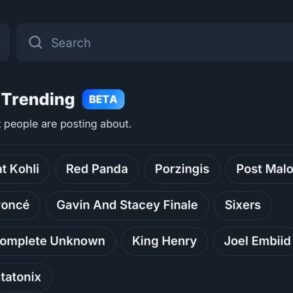
Everyone will look at surya devta (Sun God), not the phone screen first thing in the morning. Mobiles will be kept 20 feet away from the dining table during meal times, and everyone will leave their phones behind when going to the bathroom so they can focus on their business.”
These were the rules that Manju Gupta made her husband and kids agree to abide by — they had to sign a Rs 50 stamp paper this January.The homemade ‘contract’ further mentioned that anyone who breaks these rules will not be allowed to “order food via Zomato or Swiggy” for a month. A photograph of the contract, which was shared by Gupta’s niece who goes by the name @clownlamba on X (formerly Twitter) accompanied by crying emojis, went viral and garnered 6.6 lakh views within a day. Netizens applauded ‘Manju maasi’ for her unique strategy.
Manju Maasi is not alone. A section of parents across India are trying various strategies to keep their children and teens away from addictive social networking sites. Amid growing concerns about the potential dangers of teens getting hooked to the world of reels and likes and the detrimental impact of the same, several US states (see box) have passed laws banning social media use by kids. The UK government has gone a step further and is currently mulling a ban on sale of smartphones to those under 16.
EARN SOCIAL MEDIA TIME
Parents in India wish we had similar restrictions in place. “It will make our job much easier,” says Mumbai mom Darshita Chheda. She has devised a coupon system to reduce her 12-year-old son’s smartphone usage. He now has to complete an assigned task — clean his cupboard, help in the kitchen or finish a lesson — to ‘earn’ a coupon with points. This coupon can be exchanged for an hour of social media time — he loves watching YouTube Shorts. For Snapchat, Chheda has introduced a ‘holidays-only’ policy. “Medhansh really craves for Snapchat as all his friends use it, so I allow him to use the app when we are on trips. But he has to delete it the moment we return home.”
Kinjal Dedhia has simply not given in to her 11-year-old’s demands for a cellphone. “Whenever I see an article on social media’s impact on children, I make her read it. I have talked about the ban in Texas too. I have told her she can’t have a mobile till she is 14,” she says, adding that she allows her daughter to sit beside her and watch comedy reels on Instagram so she does not feel completely deprived.
NO DP AND CHAT CHECKS
Chennai-based parenting coach Seemanthini Iyer has done an oral agreement with her 12-year-old daughter and 14-year-old son. They are allowed to use WhatsApp — the elder one is also permitted to use Discord app for chatting with classmates — to communicate with friends but they are not allowed to put their photograph as a display picture, and they have to tell her the names of all those who are on their friends’ list. “They both have also agreed to let me check their chats whenever I wish to,” says Iyer, adding they had several family discussions and collaboratively agreed on the rules.
Mumbai mom Sujatha Ravi felt she should practise before she preaches so she quit social media six months ago to set the right example for her daughters (17 and 11). “Sometimes, you pick up the phone to check one message and before you know it, you have spent an hour online,” says the homemaker who wishes there was a law banning mobile phones till the age of 18. “One gets a license to drive a car only after becoming an adult, so why not restrict kids from using smartphones till they are 18,” she asks.
One gets a license to drive a car only after becoming an adult, so why not restrict kids from using smartphones till they are 18?
Sujatha Ravi, 41
Though Sujatha’s elder daughter Dharshini admits that social media is a huge distraction, she does not agree with her mom on the need for a ban. “Social media is the primary mode of communication for my generation. We don’t make phone calls or use WhatsApp so it would be harsh to ban it completely,” says the 17-year-old. Dharshini deleted her Instagram and Facebook accounts three months ago to focus on studying for the joint entrance examination (JEE) but she feels isolated. “When you are on social media you are seeing what’s happening in your friends’ lives. There is constant conversation with everyone. I barely receive just a few messages on WhatsApp now,” she says.
MOVING TO OTHER APPS
For the past year, Dharshini and some of her friends have been using the BeReal app to stay in touch as it is less stimulating and addictive. This French app gives users two minutes daily to click and post a real-time photograph to show their friends what they are up to. “BeReal does not allow one to post edited photos or reels so it is a good way to stay in touch without getting hooked,” she says.
The Mumbai teen admits she was addicted to social media a year ago — one day she watched Insta reels for eight hours non-stop. When she realised that her attention span had plummeted and she could not focus on a sum given for homework, she decided to uninstall Instagram. But soon she was addicted to YouTube so she uninstalled that too and then she started using Snapchat so much that she used to take multiple selfies daily. “It is so difficult to be disciplined. It is a vicious cycle,” she says.
A section of parents, however, feel that banning social media can lead to the ‘forbidden fruit effect’ and make it even more attractive to kids. Shweta Sheth allows her 15-year-old son Ronil to do “whatever he thinks is right” when he is online. “I feel if I am too strict, he may start lying to me. I’d rather make him aware of the consequences of his actions and leave the final decision to him,” she says.
Cyber psychologist Nirali Bhatia, who has counselled kids and parents who are stars in the reel world, feels a legislation restricting social media use by kids in India is the need of the hour. “Excessive use and dependence on social media creates pressure to maintain a certain image and number of views as well as exposes children to cyber bullying and trolling instances which can have an impact on their self-worth,” she says.





